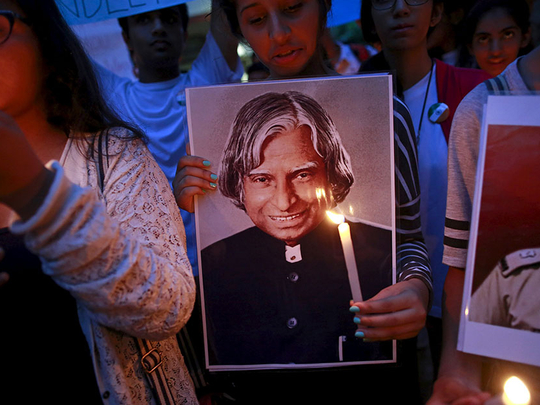
In a country where public figures are often derided, the outpouring of grief at the death of former Indian president A.P.J. Abdul Kalam at the age of 83, certainly nuanced the indelible mark he has left behind on the imagination of millions of Indians than any of his predecessors or immediate successor.
To say that the former president with an inspiring life story, was the first technocrat, a true apolitical personality, with an unconquerable optimism to occupy the highest office in the country would have all been true. But that would be a derisory description of the enduring appeal Abdul Kalam has had and will always have.
In a nation where public service is often tarnished by self-indulgence, swaggering red beacons, favouritism and high-handedness, Abdul Kalam was that rare president who actually used his office to come closer to the masses, trying to understand them, urging them to dream of a developed nation that they can proudly call theirs.
Abdul Kalam in many ways personified the India dream. He was that Indian, who succeeded in overcoming the hurdles of the hierarchical society, caste, creed and religion to reach the apex though intelligence, hard work and a quaint knack of ignoring the lesser bad for a greater good. His life story was not that of the proverbial rags-to-riches one, but of the rise of the fabled child who was born with all odds stacked against him, but still managed to touch the pinnacle of success. Born to a poor Muslim family in the southern state of Tamil Nadu, the father of the 11th president of India rented a boat to fishermen for a living.
The former president unknowingly fulfilled the nation’s need for a modern-day role model, whose accomplishment lay in the strength of his achievements outside politics and family domain. Yet, he became the most popular president in India’s history, one who did not allow his unfamiliarity with the echelons of power to handicap him in discharging his duties as the custodian of the Constitution.
Before ascending to the highest office in 2002, he worked his way up India’s scientific establishment, earning the moniker “missile man” for his pivotal role in developing the country’s short-range Prithvi missile and long-range Agni missile. When India tested nuclear weapons in 1998, Abdul Kalam, at the time chief scientific adviser to Prime Minister Atal Bihari Vajpayee of the Bharatiya Janata Party, became the most visible face of the nation.
But for the thousands, who had lined up to see him for one last time many would be unsure of his scientific achievements as for them he was the “people’s president”. One of the reasons that made Abdul Kalam’s cutting across class and political lines acceptable was his unique intrinsic gentleness and complete ignorance to protocol inspite of his stature.
However, Abdul Kalam’s biggest achievement though was to change the very nature of presidency in just one term. He restored lustre to the office of the president by not aligning with the old but connecting with the new. After India’s first prime minister Jawaharlal Nehru, no other public figure captivated the imagination of the nation’s children as Abdul Kalam did. He was that president who was willing to roost on the edge of a stage and listen to voices, rather than pompously ordain himself at its centre.
Abdul Kalam’s life is also a story of ironies. His ascendency to the presidency was probably the biggest of all. The choice of the president has always been an opportunity for the ruling party to send a message to the voting masses. Like all things in India, religion plays a role and such labels are inevitable in the cauldron of Indian politics.
He was that “good Muslim”, which the ruling right wing party of the time needed to showcase to assure that they were not averse to the largest minority community in the country especially after the Gujarat pogrom in 2002.
Abdul Kalam earned the disapproval of some for openly advertising his vegetarianism, playing the veena — a traditional stringed musical instrument which adores deity Saraswati as per Hindu mythology — for quoting the Bhagavad Gita and the Quran in the same breath and hobnobbing with Hindu religious leaders like Pramukh Swamiji and the late Acharya Mahapragya — the widely-revered Jain monk - with whom he collaborated to author the book The Family and the Nation in 2008.
He though never expressed his views about the opinions of others about him as he was least confrontationist and ensured his words did not hurt the sentiments of others. His ever-cherubic smile, Spartan taste, easy-going demeanour and simple lifestyle were what made him acceptable across the board.
However, the irony continued even on the day when he was laid to rest. The people of his country were split between two burials taking place at two corners of the country. While Abdul Kalam was given full state honours, in Rameswaram, Tamil Nadu, executed convict Yakoub Memon earned the ignominy for the Bombay blast in 1993.
One news channel debated as to whether he was the new Gandhi. Whatever Abdul Kalam was or would be now remembered for, he was certainly all about hope. The title of his books India 2020, Ignited Minds, Mission India embodied his vision and aspiration for his country’s future where despite all progress, religious beliefs still continue to brand the achievements of its citizens, that even in death he could not obliterate.










